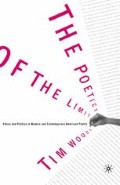Abstract
The last two chapters have established Zukofsky’s theory and praxis within a specific Adornian ideological matrix, although it is arguably only in “A”-8 and “A”-9 that Zukofsky most overtly espouses Marxist tenets. Even then, as Luke Carson has argued cogently in his perceptive analysis of Zukofsky’s treatment of labor, love, and their complex resonances with Ezra Pound’s ideas, Zukofsky’s “Marxism is highly critical of itself, and in the end can only be called Marxist in a highly qualified way.”1 “A”-9’s affiliation with Marxism is made even more complex by the historical gap in its completion, since during the Movement, there appears to be a gradual shift of focus from a phenomenological perspective to an ethical perspective—or in the poem’s terms, from labor to love, from Marx to Spinoza.2 Carson argues that this shift from labor to love in “A”-9 is a paradigmatic consequence of Zukofsky’s suspicion of the ways in which corporatist ideology increasingly subsumes and appropriates labor into an economy of production and consumption. The rhetoric of love emerges as part of a “moment of resistance within the subjective structure of industrial production.”3
Preview
Unable to display preview. Download preview PDF.
Notes
Luke Carson, Consumption and Depression in Gertrude Stein, Louis Zukofiky and Ezra Pound (New York: Macmillan, 1999), 13.
Ezra Pound’s essay “Cavalcanti” is reprinted in T. S. Eliot, ed., Literary Essays of Ezra Pound (London: Faber, 1954), 168.
reprinted in Peter Quartermain, Disjunctive Poetics: From Gertrude Stein and Louis Zukofiky to Susan Howe (Cambridge: Cambridge University Press, 1992).
See Karl Marx, “Economic and Philosophic Manuscripts of 1844,” in David McClellan, ed., Karl Marx: Selected Writings (Oxford: Oxford University Press, 1977), 78.
Jan Montefiore, Feminism and Poetry (London: Pandora, 1987), 98.
See also the descriptions of the conventional sonnet form in Joel Fineman, Shakespeare’s Perjured Eye: The Invention of Poetic Subjectivity in the Sonnets (Berkeley: University of California Press, 1986)
Ann Rosalind Jones and Peter Stallybrass, “The Politics of Astrophil and Stella,” Studies in English Literature 24.1 (Winter 1984): 66–67.
Barry Ahearn, Zukofiky’s Ä’: An Introduction (Berkeley: University of California Press, 1983), 115.
Tom Bergstein, Quantum Physics and Ordinary Language (London: Macmillan, 1974), xi.
See also Roger S. Jones, Physics as Metaphor (London: Wild-wood House, 1982), 118 and the discussion of the misconceptions deriving from conventional linguistic models to describe quantum phenomena.
H. Stanley Allen, Electrons and Waves: An Introduction to Atomic Physics (London: Macmillan, 1932), 48.
On the indeterminacy principle and the wave-particle duality that arises from the difficulties observing and measuring atoms, see Richard Feynman, “Probability and Uncertainty—the Quantum Mechanical View of Nature,” The Character of Physical Law (Cambridge, MA: MIT Press, 1965), 127–48
David Bohm, Causality and Chance in Modern Physics (London: Routledge and Kegan Paul, 1957), 71 and 82–83.
J. P. Dalton, Rudiments of Relativity 1921, quoted in Allen, Electrons and Waves 50–51.
See Terrell 1979, 99. The book is cited as Anton Reiser, Albert Einstein (New York A. and C. Boni, 1930)
Celia Zukofsky, A Bibliography of Louis Zukofsky (Los Angeles: Black Sparrow, 1969), 37.
The quotations are from Albert Einstein, Out of My Later Years (New York: Philosophical Library, 1950), 52–53 and 60–61.
Andrew Ross, “The New Sentence and the Commodity Form: Recent American Writing,” in Marxism and the Interpretation of Culture, eds. Cary Nelson and Lawrence Grossberg (London: Macmillan, 1988), 361–80.
William Carlos Williams, “The Poem as a Field of Action” (1948), in The Selected Essays of William Carlos Williams (New York: New Directions, 1954), 290.
David Bohm, Wholeness and the Implicate Order (London: Routledge and Kegan Paul, 1980), 199.
Paul de Man, “Semiology and Rhetoric,” Textual Strategies, ed. Josué V. Harari (Ithaca, NY: Cornell University Press, 1979), 121–40.
Christopher Norris, Paul de Man: Deconstruction and the Critique of Aesthetic Knowledge (London: Routledge, 1988), 50.
Baruch Spinoza, Ethics V, prop 1 (1910; London: Everyman Dent, 1986), 202.
Christopher Norris, Spinoza and the Origins of Modern Critical Theory (Oxford: Blackwell, 1991), 59.
Jonathan Bennett, A Study of Spinoza’s Ethics (Cambridge: Cambridge University Press, 1984), 14 and 127.
See Bede, A History of the English Church and People, Book 2, Chapter 13, trans. L. Sherley-Price (Harmondsworth: Penguin, 1955), 124–25.
Gilles Deleuze, Spinoza: Practical Philosophy trans. Robert Hurley (San Francisco: City Lights, 1988), 50–51.
Michael Heller, “Some Reflections and Extensions: Zukofsky’s Poetics,” MAPS 5 (1973): 22–25.
Terry Eagleton, “Capitalism, Modernism and Postmodernism,” Against the Grain (London: Verso, 1986), 139–41.
Copyright information
© 2002 Tim Woods
About this chapter
Cite this chapter
Woods, T. (2002). “A”-9: A Labor of Love, or a Love of Labor?. In: The Poetics of the Limit. Palgrave Macmillan, New York. https://doi.org/10.1007/978-1-137-03920-0_5
Download citation
DOI: https://doi.org/10.1007/978-1-137-03920-0_5
Publisher Name: Palgrave Macmillan, New York
Print ISBN: 978-1-349-63392-0
Online ISBN: 978-1-137-03920-0
eBook Packages: Palgrave Literature & Performing Arts CollectionLiterature, Cultural and Media Studies (R0)

